In “To Kill a Mockingbird”, author Harper Lee famously wrote: “You can choose your friends but you sho’ can’t choose your family.”
In the new Japanese film “Shoplifters”, one major theme is that you can choose both your family and your friends.
Directed by Hirokazu Koreeda, the original Japanese title was “Manbiki Kozuku” which means ‘shoplifting family’. It’s a film about a group of young and old misfits who’ve decided to become a very unconventional family unit.
Ahmad Coo is a producer and copy editor for the Global Business show on CGTN America. His analysis represents his views alone.
From the opening scene to the last frame, “Shoplifters” is perfect. It’s a slow burning movie full of pathos, compassion, and tough love. Its characters endear themselves to you and just like real life, they also let you down and break your heart.
The family is anchored by the couple Osamu and Nobuyo Shibata (played by Lily Franky and Sakura Ando). They live with an elderly woman Hatsue, a boy Shota, and another woman Aki.
It’s not your typical nuclear family setup in any legal sense because none of the members are actually related to each other by blood or lineage. Even Osamu and Nobuya aren’t legally married. The film doesn’t really detail how the family found each other, but it’s clear that the family love and care for each other very deeply.
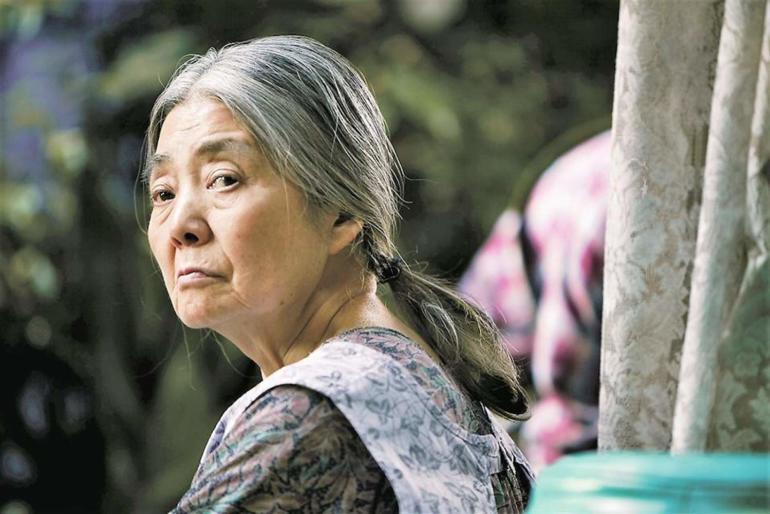
The late, great Kirin Kiki in Shoplifters Credit: Gaga, Magnolia Pictures
Considered outcasts of Japanese society, the Shibatas work dead-end jobs, shoplift, engage in sex work, and swindle some unsuspecting families. But on the surface, they’re not hardened criminals capable of great evil. Rather they’re the flotsam and jetsam of a Japanese society that’s been unraveling for decades. It’s a mistake, however, to say that they’re harmless. They’re definitely a group of deeply flawed individuals, some with very dark pasts.
With “Shoplifters”, Koreeda further lifts the shiny veneer that the West views polishes on Japan. What you see in most mainstream movies about Japan is only partially true — You know what I mean… the hi-tech, high fashion, culturally quirky version of the country.
As in his other films “Nobody Knows”, “Still Walking” and “After the Storm”, Koreeda exposes the slowly rotting aspects of Japan. One with crumbling social services and infrastructure, as well as a shrinking economy. His is an unflinching stare at a country that’s in steep decline — especially with the collapse of the family unit.
Judging from what’s shown in the film, the family home is about 500 square feet. It’s a decent sized abode for a typical Japanese couple, not for a family of six.
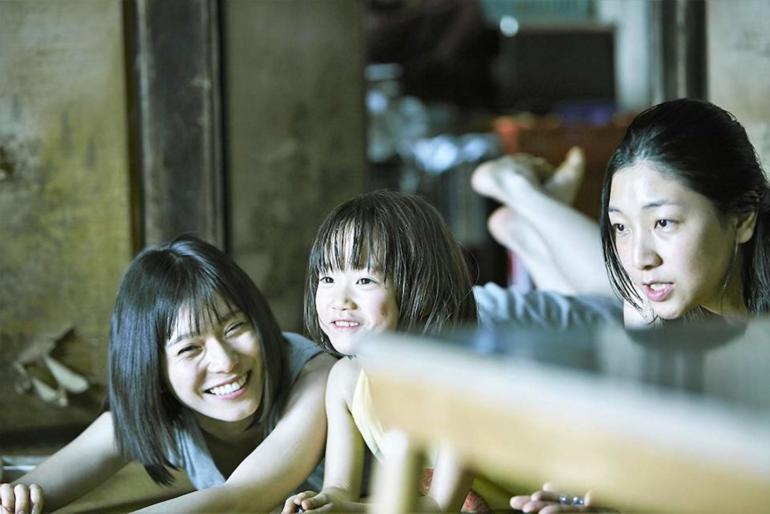
(L-R) Mayu Matsuoka, Miyu Sasaki and Sakura Ando in Shoplifters Credit: Gaga, Magnolia Pictures
Despite their downward mobility and their small home, the family is decidedly content. They’re probably the one the happiest families I’ve ever seen on film. The father and son dynamic between Osamu and Shota is genuinely endearing even as they shoplift together. Compared to the typical Japanese family, they’re barely dysfunctional.
But their world shifts when they take in Yuri, a little girl they discovered in an alley while she was rummaging through garbage for food. When they take her home and give her a bath and a meal, and discover Yuri’s badly bruised and scarred body. Seeing the signs of abuse, they take her in wholeheartedly. Osamu even starts her calling daughter days after adopting her.
Yuri’s addition further brightens an already happy family. She becomes everyone’s favorite, with everyone doting on her. There’s some initial jealousy from Shota as his role of the youngest is taken over but that eventually fades and they’re soon inseparable partners-in-petty-crime.
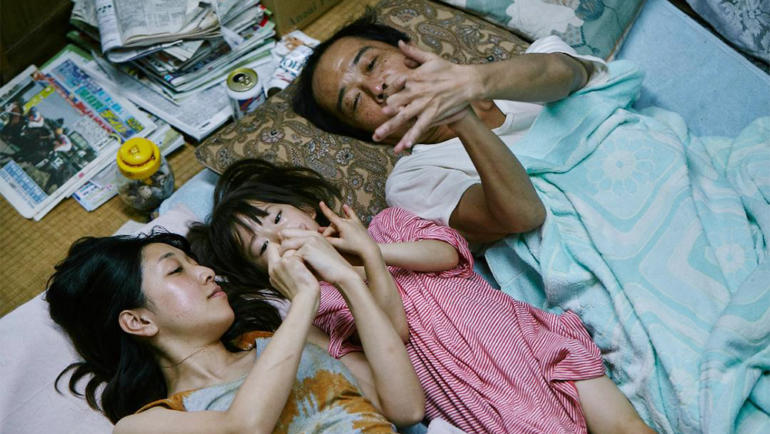
Sakura Ando, Miyu Sasaki and Lily Franky in Shoplifters Credit: Gaga, Magnolia Pictures
But Yuri is also the reason why this family’s peculiar version of Eden will be turned on its head. After several months, Yuri’s birth parents finally go to the police to file a missing persons report. Despite their negligence and abuse, they want their daughter back.
Cracks begin to appear between the main characters as Yuri’s disappearance becomes fodder for the daily news cycle. Soon the family begins questioning each others’ loyalties. They try to shut out the real world, but the police investigation is slowly threatening to unravel their safe haven.
Despite taking extraordinary steps to protect themselves, everyone in the family is forced to make difficult choices, choices that will dissolve the family.
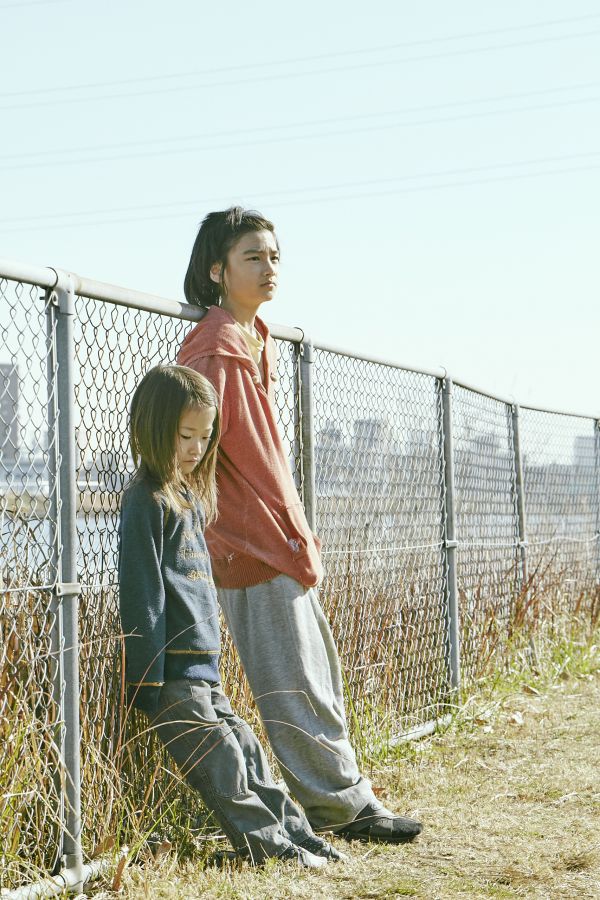
Miyu Sasaki and Jyo Kairi in Shoplifters Credit: Gaga, Magnolia Pictures
With “Shoplifters”, Koreeda wanted to show how members of a truly loving family should act towards one another. Here were some of society’s leftovers, people who should have grown bitter and turned cruel due to their lot in life. Instead, they’re the best versions of themselves infinitely capable of compassion and empathy. It’s a not-so subtle irony Koreeda uses to take a dig at Japan’s crumbling societal structures.
I found myself envying this make-believe family and the love and care they showed for each other. In an age when both cynicism and familial dysfunction is par-for-course for almost every other Hollywood drama that comes out nowadays, “Shoplifters” is the antidote to a tired genre.
But the film is far from a cloyingly positive take on families. Ultimately, “Shoplifters” is dark and a depressing movie. Despite their love, every member of the family is dealing with psychological trauma stemming from abandonment issues.
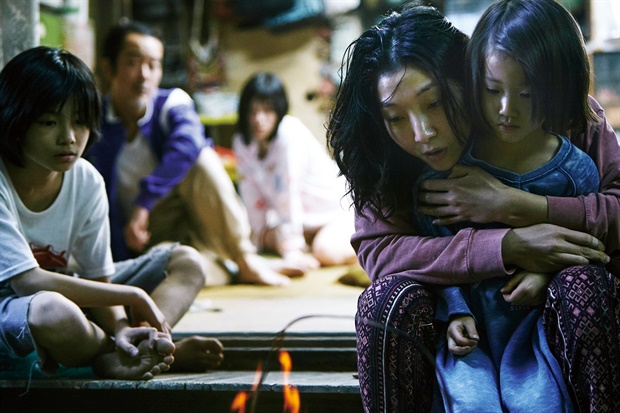
(L-R) Jyo Kairi, Lily Franky, Mayu Matsuoka, Sakura Ando, and Miyu Sasaki Credit: Gaga, Magnolia Pictures
But despite the dark ending, it’s the moments of love in the film that stay with you.
In one of the film’s many heartrending scenes, we see Yuri sitting by a makeshift bonfire surrounded by the whole family. She had just come from the bath and it’s the first time everyone sees the bruises and scars covering her arms and legs. Yuri is still trying to figure out how to act in front of these strangers, fearing that they might react the way her parents often do at perceived transgressions — with physical and emotional violence.
Nobuya, sensing the girl’s unease, slowly wraps her arms around the startled child.
“This is how parents are supposed to show love,” Nobuya would repeatedly say, almost like a chant or prayer meant to sooth Yuri’s psychic and bodily wounds — all the while slowly cradling her like a newborn baby in her arms.
I wept at this display of affection, wanting to experience the same tenderness, love and mercy between two people repeatedly let down by an indifferent world.
We should all be so lucky.
 CGTN America
CGTN America
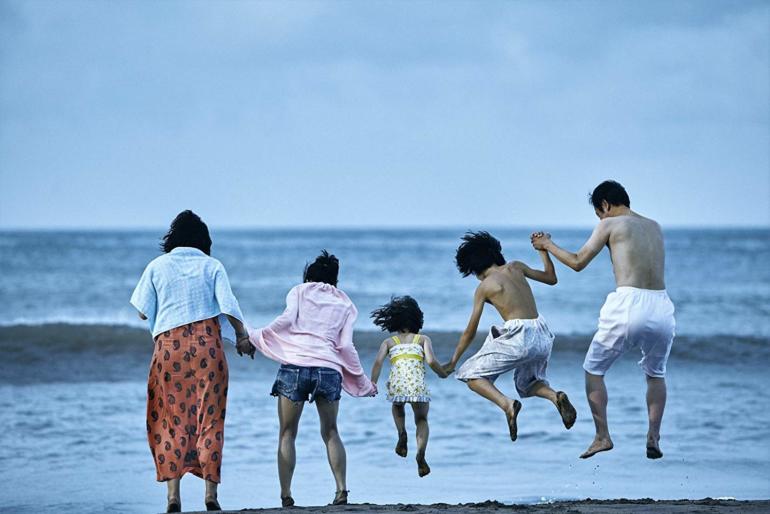 Sakura Andô, Mayu Matsuoka, Miyu Sasaki, Jyo Kairi, and Lily Franky in Shoplifters Credit: Gaga, Magnolia Pictures
Sakura Andô, Mayu Matsuoka, Miyu Sasaki, Jyo Kairi, and Lily Franky in Shoplifters Credit: Gaga, Magnolia Pictures

